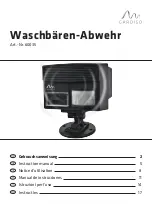
6-5
Section
Work Bits (Internal Relays)
356
In the following example, HR 0000 will be turned ON when IR 00002 is ON and IR
00003 is OFF. HR 0000 will then remain ON until either IR 00004 or IR 00005
turns ON. With KEEP, as with all instructions requiring more than one instruction
line, the instruction lines are coded first before the instruction that they control.
00002
00004
00003
00005
R: reset input
S: set input
KEEP(11)
HR 0000
Address
Instruction
Operands
00000
LD
00002
00001
AND NOT
00003
00002
LD
00004
00003
OR
00005
00004
KEEP(11)
HR
0000
6-4-4
Self-maintaining Bits (Seal)
Although the KEEP instruction can be used to create self-maintaining bits, it is
sometimes necessary to create self-maintaining bits in another way so that they
can be turned OFF when in an interlocked section of a program.
To create a self-maintaining bit, the operand bit of an OUTPUT instruction is
used as a condition for the same OUTPUT instruction in an OR setup so that the
operand bit of the OUTPUT instruction will remain ON or OFF until changes oc-
cur in other bits. At least one other condition is used just before the OUTPUT
instruction to function as a reset. Without this reset, there would be no way to
control the operand bit of the OUTPUT instruction.
The above diagram for the KEEP instruction can be rewritten as shown below.
The only difference in these diagrams would be their operation in an interlocked
program section when the execution condition for the INTERLOCK instruction
was ON. Here, just as in the same diagram using the KEEP instruction, two reset
bits are used, i.e., HR 0000 can be turned OFF by turning ON either IR 00004 or
IR 00005.
00002
00003
HR 0000
HR 0000
00004
00005
Address
Instruction
Operands
00000
LD
00002
00001
AND NOT
00003
00002
OR
HR
0000
00003
AND NOT
00004
00004
OR NOT
00005
00005
AND LD
---
00006
OUT
HR
0000
6-5
Work Bits (Internal Relays)
In programming, combining conditions to directly produce execution conditions
is often extremely difficult. These difficulties are easily overcome, however, by
using certain bits to trigger other instructions indirectly. Such programming is
achieved by using work bits. Sometimes entire words are required for these pur-
poses. These words are referred to as work words.
Work bits are not transferred to or from the PC. They are bits selected by the
programmer to facilitate programming as described above. I/O bits and other
dedicated bits cannot be used as works bits. All bits in the IR area that are not
allocated as I/O bits, and certain unused bits in the AR area, are available for use
as work bits. Be careful to keep an accurate record of how and where you use
work bits. This helps in program planning and writing, and also aids in debugging
operations.
















































